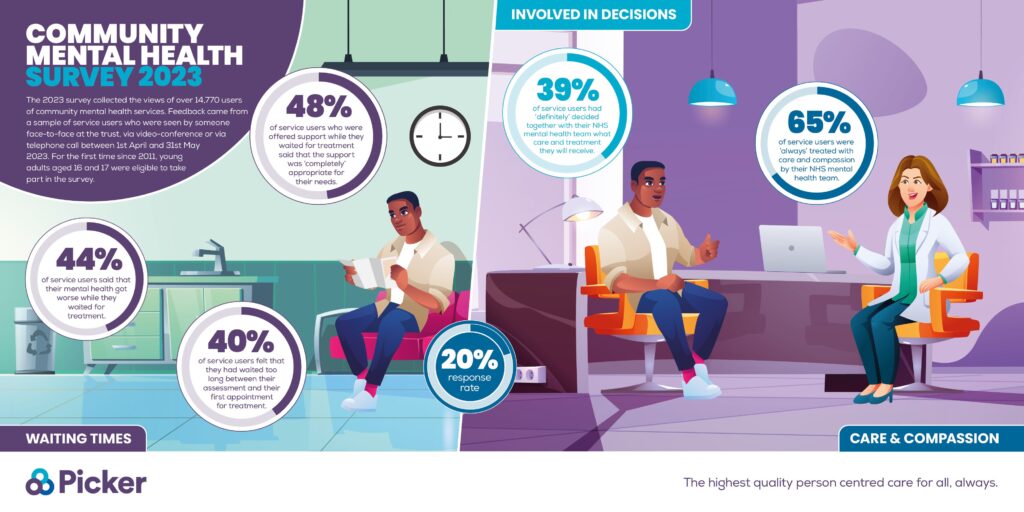NHS staff experience improving, according to world’s largest workforce survey
The experiences of staff working in the NHS in England have improved across a range of important areas, including to new results from the world’s largest workforce survey. Compared to the previous survey in 2022, staff are markedly more likely to say that they would recommend their organisation as a place to work; that they would be happy with the standard of care provided if a friend or relative needed treatment; and that they have the right support and resources to do their jobs. However, results for many key measures of staff experience remain below pre-Covid levels.
Results from the NHS Staff Survey, which was coordinated by the independent charity Picker on behalf of NHS England, included responses from more than 700,000 NHS staff working across more than 200 organisations. The survey included all directly employed staff in secondary and tertiary care organisations, ranging from consultants to care assistants and from porters to paramedics. Questions in the survey cover all aspects of work experiences, with a particular focus on those described by NHS England’s People Promise.
Noteworthy improvements in key areas
The survey showed large improvements in a range of important areas. Two headline measures that had fallen since 2020 showed signs of recovery: the proportion of staff who would recommend their organisation as a place to work jumped 3.7% points to 61.1%, whilst the 65.0% said that they would be happy with the standard of care provided by their organisation if a friend or relative needed treatment, a 2.0% point improvement on 2022. Results for both measures remain below the pre-Covid levels recorded in 2019, which were 63.4% and 71.5% respectively – but NHS providers will be encouraged by the scale of improvements in 2023.
Some of the most striking improvements in the survey were around workload and resources. After declines on most of these questions in 2021 and 2022, results are now equal to or higher than they were before the pandemic in 2019. For example, 46.7% of staff said that they are “able to meet all the conflicting demands on their time at work”; a 3.7% improvement from 2022, and 0.7% higher than in 2019. There was an even bigger improvement in the proportion who said that there are enough staff in their organisation for them to do their job properly – up 6.0% points from 26.4% in 2022 to 32.4% in 2023. The concern remains that only a minority of staff agreed with these statements – but the improvements are substantial and demonstrate good progress in an area that has long been challenging.
Pay satisfaction trends
The 2023 survey was conducted during September, October, and November 2023. This was several months after freshly agreed pay deals were implemented for most staff groups – but at a time when junior doctors and consultant remained in dispute. Overall, satisfaction with pay improved by 5.6% points compared to 2022 – but remains low at 31.2%. Perhaps reflecting ongoing disputes, trends differ for different staff groups: whilst most are now more satisfied with pay than in 2022, the proportion of medical and dental staff who were satisfied with their pay fell by 4.5% points to 32.0% – continuing a steep decline from a high of 56.9% in 2020.
New survey inclusion in the 2023 NHS Staff Survey
This year, the survey included a new question asking staff whether they had “been the target of unwanted behaviour of a sexual nature in the workplace”, either from patients and the public or from colleagues. The definition of “unwanted behaviour” is broad, including inappropriate conversations and ‘jokes’ as well as touching and assault. Overall, 8.7% of staff – equivalent to more than 120,000 people when scaled to the size of the workforce – reported being the target of unwanted sexual behaviour from patients and the public. Unsurprisingly, this figure was much higher for staff in roles that are frequently patient-facing (11.5%), and there was significant variation between different staff groups. The highest rates were reported by ambulance technicians (36.1%) and paramedics (32.2%).
Commenting on the findings, Chris Graham, Chief Executive at Picker, said:
The results from the 2023 NHS Staff Survey provide welcome good news for providers, as they show frequently substantial improvements across many of the most important areas of workforce experience. This follows a period of time where staff experience had suffered in the wake of the pandemic, and – whilst in many cases results have not yet returned to the pre-pandemic level – it is encouraging to see these improvements in staff engagement and wellbeing.
“With more than 700,000 responses nationally, the survey is a goldmine of insight for organisations wishing to understand the experiences of their staff. Beneath the national level, it offers detailed evidence on the experiences of different staff and demographic groups within trusts – and we encourage all providers to delve deep into the data to understand how different parts of their workforce experience working life. There is much room for further improvement and an opportunity to build on progress over the last year to make the NHS the best possible place to work. This should be a top priority for organisations, both because better workforce experience is associated with a range of positive outcomes – including better patient experiences, lower sickness absence rates, and higher staff retention – and because the people working hard to deliver a person centred health service deserve to see that care reciprocated.
END
Notes to editors
- For media enquiries, please contact Lorraine Pullen (lorraine.pullen@pickereurope.ac.uk; 07825 952160).
- The NHS Staff Survey is coordinated by Picker on behalf of NHS England. Fieldwork for the survey was conducted between September and November 2023.
- Taking part in the survey is compulsory for all NHS trusts and voluntary for other NHS organisations such as Integrated Care Boards and Social Enterprises. This year, 268 organisations participated, including all of England’s 213 NHS Trusts.
- As in 2022, all participating organisations undertook a census of all eligible employees. Overall, 707,460 people responded to the survey from 1.4 million who were invited: a response rate of 48%, up 2% points from 2022. The vast majority of respondents (94%) completed the survey online. The survey is understood to be the world’s largest published workforce survey.
- National results include data from 678,676 staff at 213 NHS trusts.
- All staff in full-time or part-time roles employed in participating organisations on 1st September 2023 were eligible for the survey. This includes staff on fixed-term contracts; on secondments; on sickness absence of up to 12 months; on parental leave; or suspended.
- Staff were not eligible for the survey if they were employed by sub-contracted or outside organisations or if they had been on long-term sick leave for more than a year. Staff providing only bank or locum services were able to participate in the survey but their responses are not included in the national results.
- Full results for the survey are available from www.nhsstaffsurveys.com.
- As noted in the national briefing report, results for one set of questions – Q13a-d, which cover experiences of physical violence – are not included in today’s release because of a data quality issue that was identified close to publication. In some cases, staff accessing the survey via an iPhone did not see this question displayed correctly, leading to an unusually high rate of missing responses from this group. This is believed to have affected around 3% of respondents. A decision not to report this data today has been made in line with NHS England and the Survey Coordination Centre’s commitment to ensuring that the results from the survey are of the highest quality. Work is underway to investigate this issue and once this is completed it may be possible to publish results at organisation and aggregate level.
- Picker’s team of researchers and data scientists are available to support organisations in understanding, measuring, and using workforce and user experience. For queries about our services or to request a call, please contact info@pickereurope.ac.uk.

